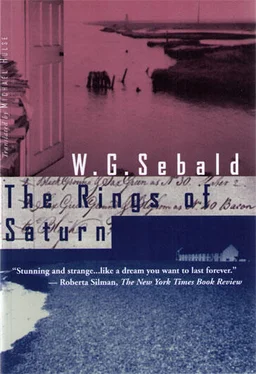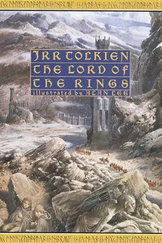From July until early September, when he left for London, Korzeniowski made three round trips as an ordinary seaman aboard the Skimmer of the Seas, a coaster that plied between Lowestoft and Newcastle. Little is known of how he spent the second half of June in the fishing port and bathing resort of Lowestoft, which could not have afforded a greater contrast to Marseilles. Doubtless he rented a room and made whatever enquiries were necessary for his plans. In the evenings, when the darkness settled upon the sea, he will have strolled along the esplanade, a twenty-one-year-old foreigner alone amongst the English. I can see him, for instance, standing out on the pier, where a brass band is playing the overture from Tannhäuser as a night-time serenade. And as he walks homeward past those who remain to listen, with a gentle breeze coming off the water, he is intrigued by the ease with which he is absorbing a hitherto quite unfamiliar language, a language he will one day employ to write the novels that will win him worldwide acclaim, whilst for now it fills him with an altogether new sense of purpose and confidence. By his own account, Korzeniowski's first English tutors were the Lowestoft Standard and the Lowestoft Journal , in which, during the week of his arrival, the following motley assortment of news items was brought to the public's attention: an explosion in a mine in Wigan cost two hundred lives; in Rumelia there was a Mohammedan uprising; in South Africa the kaffir unrest had to be suppressed; Lord Grenville expatiated on the education of the fair sex; a despatch boat was sent to Marseilles to take the Duke of Cambridge to Malta, where he was to inspect the Indian troops; a housemaid in Whitby was burnt alive when her dress, onto which she had accidentally spilt paraffin, caught light at an open fire; the steamship Largo Bay left the Clyde with three hundred and fifty-two Scottish emigrants aboard; a Mrs Dixon of Silsden was so overjoyed to see her son Thomas, who, after ten years' absence in America, suddenly turned up at her door, that she had a stroke; the young Queen of Spain was growing weaker by the day; work on the fortifications of Hong Kong, where two thousand coolies were slaving, was approaching completion; and in Bosnia, so the Standard reports, all highways are infested with bands of robbers, some of them mounted. Even the forests around Sarajevo are swarming with marauders, deserters and francs-tireurs of all kinds. Travelling, therefore, is at a standstill.
In February 1890, twelve years after his arrival in Lowestoft and fifteen years after his departure from the station at Cracow, Korzeniowski, who now had British citizenship and his captain's papers and had seen the most far-flung regions of the earth, returned for the first time to Kazimierówka and the house of his Uncle Tadeusz. In a note written much later he described his arrival at the Ukrainian station after brief stops in Berlin, Warsaw and Lublin. There his uncle's coachman and majordomo were waiting for him in a sleigh to which four duns were harnessed but which was so small that it almost looked like a toy. The ride to Kazimierówka took another eight hours. The majordomo wrapped me up solicitously, writes Korzeniowski, in a bearskin coat that reached to the tips of my toes and put an enormous fur hat with ear flaps on my head, before taking his seat beside me. When the sleigh started off, to a soft and even jingle of bells, a winter journey back into childhood began for me. The young coachman, who was perhaps only sixteen years old, found the way across the endless snow-covered fields with an unfailing instinct. When i commented on his astounding sense of direction (Korzeniowski continues), never hesitating and not once taking a wrong turn, the majordomo replied that the young fellow was the son of Joseph, who had always driven grandmother Bobrowska of blessed memory and later served Pan Tadeusz with equal loyalty, until cholera ended his days. His wife, the majordomo said, died of the cholera too, which reached us when the ice was breaking, and so did a whole houseful of children, and the only one who survived was this deaf mute sitting in front of us on the box. He was never sent to school and no one ever expected he would be much use for anything till it turned out that horses were more obedient to him than to any other stable-boy. And when he was about eleven it emerged on some occasion or other that he had the map of the entire district in his head, complete with every bend in the road, so accurately you'd think he'd been born with it. Never, writes Korzeniowski, have I travelled better than that day as we journeyed into the setting dusk. As in the old days, long ago, I saw the sun going down over the plains, a great red disc sinking into the snow as though it were setting upon the sea. Swiftly we drove on into the gathering dark, into the infinite white wastes that met the starry skies at the horizon, where villages amidst trees floated like shadowy islands.
Before he set off for Poland and the Ukraine, Korzeniowski had applied for a job with the Société Anonyme Belge pour le Commerce du Haut-Congo. Immediately after his return to Brussels he called in person on the managing director, Albert Thys, at the Société's main offices in rue de Brederode. Thys, whose shapeless body was forced into a frock coat that was far too tight, was sitting in a gloomy office beneath a map of Africa that covered the entire wall, and the moment Korzeniowski had stated his business, without further ado, he offered him the command of a steamer that applied the upper reaches of the Congo, because the captain, a German or Dane by the name of Freiesleben, had, as it happened, just been killed by the natives. After two weeks of hasty preparation and a cursory medical, conducted by the Société's ghoulish doctor, Korzeniowski took the train to Bordeaux, where in mid-May he embarked on the Ville de Maceió, bound for Boma. At Tenerife he was already beset with dark premonitions. Life, he wrote to his beautiful and recently widowed Aunt Marguerite Poradowska in Brussels, is a tragicomedy — beaucoup de rêves, un rare éclair de bonheur, un peu de colère, puis le désillusion, des années de souffrance et la fin — in which, for better or worse, one had to play one's part. In the course of the long voyage, this dispirited frame of mind, the madness of the whole colonial enterprise was gradually borne in upon Korzeniowski. Day after day the coastline was unchanging, as if the vessel were making no progress. And yet, wrote Korzeniowski, we passed a number of landing places and trading posts with names like Gran' Bassam or Little Popo, all of them seeming to belong in some sordid farce. Once we passed a warship anchored off a dreary beach where not the smallest sign of any settlement was to be seen. As far as the eye could reach there was nothing but ocean, sky, and the hair-thin green strip of bush vegetation. The ensign hung limp from the mast, the ponderous iron vessel rose and fell on the slimy swell, and at regular intervals the long six-inch guns fired off shells into the unknown African continent, with neither purpose nor aim.
Bordeaux, Tenerife, Dakar, Conakry, Sierra Leone, Cotonou, Libreville, Loango, Banane, Boma — after four weeks at sea, Korzeniowski at last reached the Congo, one of those remote destinations he had dreamt of as a child. At that time the Congo had been but a white patch on the map of Africa over which he had often pored for hours, reciting the colourful names. Little was marked in the interior of this part of the world, no railway lines, no roads, no towns, and, as cartographers would often embellish such empty spaces with drawings of exotic beasts, a roaring lion or a crocodile with gaping jaws, they had rendered the Congo, of which they knew only that it was a river measuring thousands of miles from its source to the sea, as a snake coiling through the blank, uncharted land. Since then, of course, detail had been added to the map. The white patch had become a place of darkness. And the fact is that in the entire history of colonialism, most of it not yet written, there is scarcely a darker chapter than the one termed The Opening of the Congo . When the Association internationale pour l'Exploration et la Civilisation en Afrique was established in September 1876, it was with a declaration of the most high-minded intentions and ostensibly without any vested national or private interests. Exalted personages representing the aristocracy, the churches, the sciences, industry and finance, attended the inaugural meeting, at which King Leopold, patron of the exemplary venture, proclaimed that the friends of humanity could pursue no nobler end than that which brought them together that day: to open up the last part of our earth to have remained hitherto untouched by the blessings of civilization. The aim, said King leopold, was to break through the darkness in which whole peoples still dwelt, and to mount a crusade in order to bring this glorious century of progress to the point of perfection. In the nature of things, the lofty spirit expressed in this declaration was lost from sight. As early as 1886, Leopold, now styled Sovereign de l'Etat Indépendent du Congo, was the sole ruler of a territory on the second longest river on earth, a million square miles in area and thus a hundred times the size of the mother country, and was accountable to no one for his actions. Ruthlessly he set about exploiting its inexhaustible wealth, through trading companies such as the Société Anonyme Belge pour le Commerce du Haut-Congo, the soon legendary profits of which were built on a system of slave labour which was sanctioned by all the shareholders and all the Europeans contracted to work in the new colony. In some parts of the Congo, the indigenous people were all but eradicated by forced labour, and those were taken there from other parts of Africa or from overseas died in droves of dysentery, malaria, smallpox, beriberi, jaundice, starvation and physical exhaustion. Every year from 1890 to 1900, an estimated five hundred thousand of these nameless victims, nowhere mentioned in the annual reports, lost their lives. During the same period, the value of share sin the Compagnie du Chemin de Fer du Congo rose from 320 Belgian francs to 2,850.
Читать дальше












